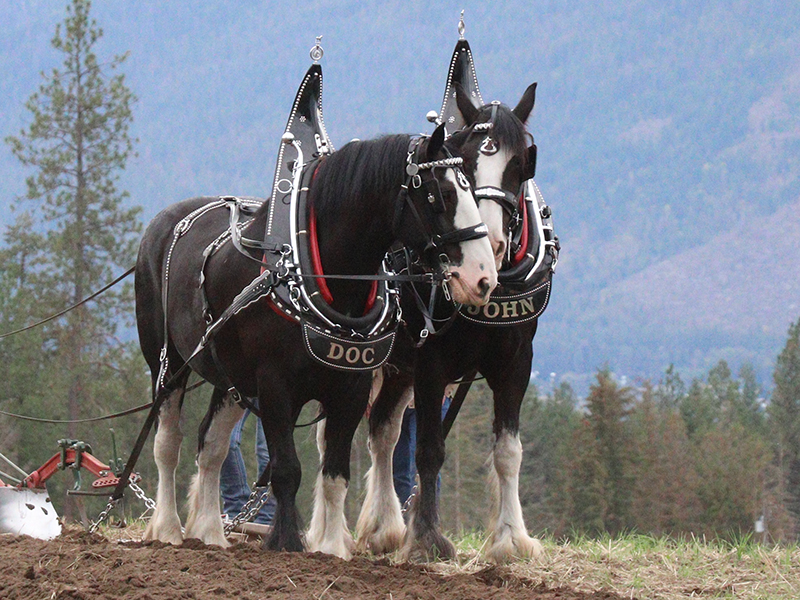The public space in our office/farm store building has recently become a regular meeting place for a local group of wool spinners, my wife Ann among them. Their gatherings are informal two-hour afternoon spinning sessions.
The activity is communal, tactile and agrarian. Stories are told, knowledge is shared, and fleece is turned into yarn with admirable skill born of knowledge, practice and aptitude. Not unlike the careful husbandry of sheep, or a good working herd dog, or a well-tended garden or the manner of a quiet and competent teamster.
Many such skills have largely disappeared. My grandfather told stories of his youth handling horses in fields and woods, but there was no need or opportunity to transmit his skill to any of his grandchildren. I knew one man who used horses his entire life. He is gone now, and though he did leave many amusing stories with those who knew him, few of his teamster skills survived his passing.
Many such skills are now deemed to be hopelessly old-fashioned and irrelevant to the agricultural industry of today. Any agricultural economists seeing this will be rolling their eyes at this point. Farmers and ranchers need to be, first and foremost, business managers, firmly focussed on the bottom line and growing their business. There is no place for nostalgic pursuits and pipe dreams. Where on the asset ledger would you list pride of place or husbandry?
Properly industrialized agriculture will eliminate the need for any such skills or local knowledge. The global, corporate, integrated, high-tech, AI-operated, industrial-scale, bioengineered and chemically manipulated biome agriculture industry will dismiss the inefficient folly of domestic, communal agrarianism, its practices and ultimately its practitioners, as obsolete. Their skills and stories are no longer relevant or required, and their efforts near-comic as they march toward inevitable replacement by global, industrial agri-business. Or so they say.
This replacement has now been underway for more than 60 years. I first came face-to-face with it in the office of my Grade 10 guidance counsellor in the fall of 1963. It was a one-on-one session to determine what path my high school education should be preparing me for. According to the aptitude test results, I should be aiming for a career in the military. I passed on that. Ditto the second suggestion to be a forest ranger. Somewhat exasperated, the counsellor asked what I planned to do when I graduated. I said, “Go farming.” He laughed out loud and rolled his eyes.
It occurred to me then and there he didn’t understand or appreciate where food came from before he found it on a store shelf. He may have given it some thought because a few days later he asked if I was serious, apologised for laughing, and said he thought I was probably smart enough to go to university. Long story short, I didn’t go to university and I didn’t graduate from high school, but I’m still farming 61 years later.
Twenty-some years later at a parent-teacher conference discussing my son’s under-achievement in Grade 10 math, I was told it was lucky for him I was a farmer because he probably wasn’t smart enough to do anything else. Turns out that wasn’t an accurate assessment, either.
I offer this reminiscence to illustrate the often-held negative perception of what farming and being a farmer is all about.
Doubtless there are many who will agree with those teachers and the agri-economists, agri-industrialists, agri-venture capitalists and agri-monopolists and lay the blame for the high price of pickles in Paraguay at the feet of all those pampered, inefficient yokels who still shell peas by hand and call their cows by name.
Be that as it may, though the number of farms and ranches continues to decline, 98% of them are still family-owned and operated. And though the average age of all those farmers and ranchers continues to climb, nearly every one of them still takes pride in the care of their land and being part of the agrarian community. They still know the true value of having good neighbours, and willingly understand the obligation to be one in return. They still appreciate the value of sharing the skills and stories that have been passed on and learned.
None of that ever shows up on a balance sheet and the algorithm at your bank won’t recognize it. It might be fiscally intangible, but it is essential to the 2% of the population who keep making this work. I knew it in 1963, and I still know it today.
I expect most of you do, too.
Thanks to everyone who takes the time to read the Back Forty. Happy New Year to all of you and those you love. Take a bit of time to swap a yarn or even spin some!
Bob Collins raises beef cattle and grows produce on his farm in the Alberni Valley.


 Vineyards enter new year with recovery in sight
Vineyards enter new year with recovery in sight